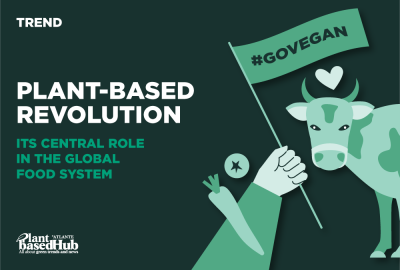Atlante
News
Plant-Based Menus: How Food Service Can Lead the Transition to a Sustainable Future

13 June 2025
In an era where the climate crisis demands increasingly conscious choices at every level of society, public institutions face a key responsibility: to promote sustainable, accessible, and healthy food systems. Schools and hospitals, in particular, are strategic environments where change can take root with long-term impact—not only for individual health but also for the health of the planet.
With this goal in mind, the Plant-Based School Food Coalition, together with a network of non-governmental organizations, has submitted a formal intervention to the United Nations Framework Convention on Climate Change (UNFCCC). The initiative, part of the so-called “Submission to the UNFCCC,” aims to bring the topic of plant-based, sustainable meals into global climate policy, explicitly calling for recognition of the transformative role of public catering.
Rethinking the Global Food System
The global food system is now recognised as one of the leading contributors to climate change. According to the latest estimates, it accounts for around one-third of global greenhouse gas emissions. Food production, processing, transport, and consumption generate a significant environmental impact, often at the expense of the most vulnerable communities.
The Plant-Based School Food Coalition highlights how transforming public catering—by adopting seasonal, plant-based meals—can be a powerful lever to reduce environmental impact and support more equitable food systems.
An Educational and Health Opportunity
Introducing sustainable meals in school and hospital cafeterias is not just an ecological action—it is also an educational and public health initiative. Schools, for example, are ideal environments to instill proper food values and habits from a young age. Regularly offering plant-based meals helps normalize these dietary choices, fostering a more conscious food culture.
At the same time, hospitals can play a central role in promoting prevention and treatment through diet. Numerous studies show the benefits of plant-based eating in managing chronic diseases such as diabetes, cardiovascular disease, and obesity. Introducing plant-based meals in healthcare settings is a tangible way for food service to contribute to public health.
The Appeal to the UNFCCC
In the document submitted to the UNFCCC, the signatories—including Compassion in World Farming, Feedback, Four Paws, Youth Climate Save, ProVeg International, and Plant Based Treaty—emphasize the urgency of including sustainable public meals in climate strategies. Their demands are structured around three key points:
- Recognition of the transformative value of sustainable meals in the public sector.
- Explicit inclusion of this issue in official UNFCCC documents and future climate conferences (COP).
- Adoption by Member States of clear policies to promote plant-based meals within educational and healthcare systems.
The ultimate goal is to create a globally replicable model capable of positively impacting both people’s health and the planet’s.
A Concrete Example: Los Angeles Schools
Among the most successful real-world examples is the Los Angeles Unified School District, the second-largest school district in the United States. The administration has initiated a major transition toward a more sustainable menu by reducing meat offerings and regularly introducing plant-based options.
These initiatives, besides being logistically and economically viable, have been well received by both students and families—confirming that interest in healthier, more responsible eating habits is strong—even among younger generations..
The coalition behind the submission represents a global network committed to promoting sustainable diets and systemic change in food policy. Their joint action aims to shift the climate debate toward a more integrated approach, where everyday food choices are seen as tools for action and transformation.
Growing Demand for Plant-Based Menus in Italy’s Out-of-Home Market
IIn Italy, demand for plant-based food is also reshaping the food service sector, as operators adapt to changing consumption behaviours. One in four foodservice operators has observed significant interest in plant-based products, and one in three restaurateurs is planning to include a plant-based burger in their menu (Source: TradeLab, 2024). This choice not only satisfies the tastes of more demanding consumers but also offers a way to diversify menus, attract new clientele, and position businesses as innovators in a highly competitive market.
To support this shift in consumption—which is expanding from retail into food service—at Atlante, we have invested in developing a dedicated plant-based range for professionals. Our selection is designed to offer flexibility, consistency, and value in a fast-evolving market.
The transition to a more sustainable diet also depends on out-of-home consumption. Bringing plant-based choices to menus is not only possible—it is increasingly necessary to build a healthier, more responsible future.





